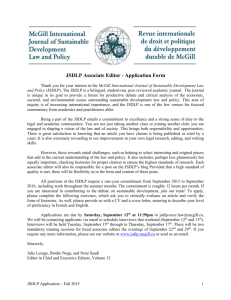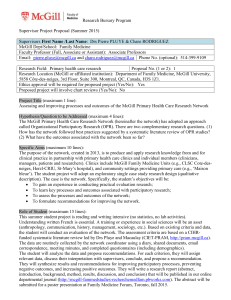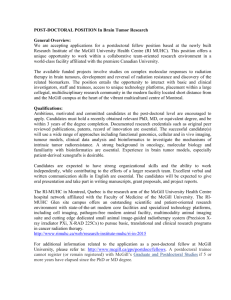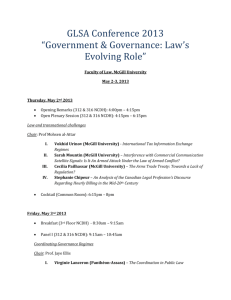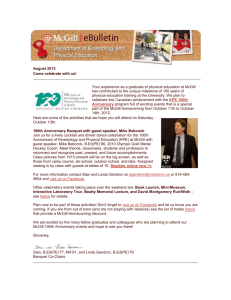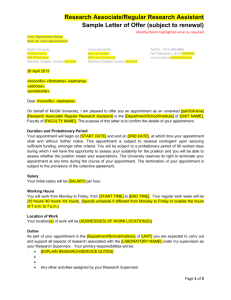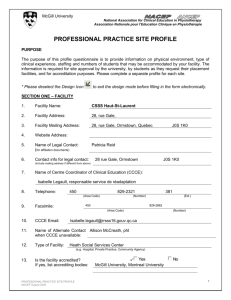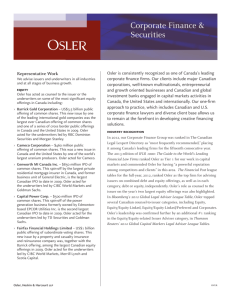Best Practices in Digitization and Digital Curation at McGill
advertisement
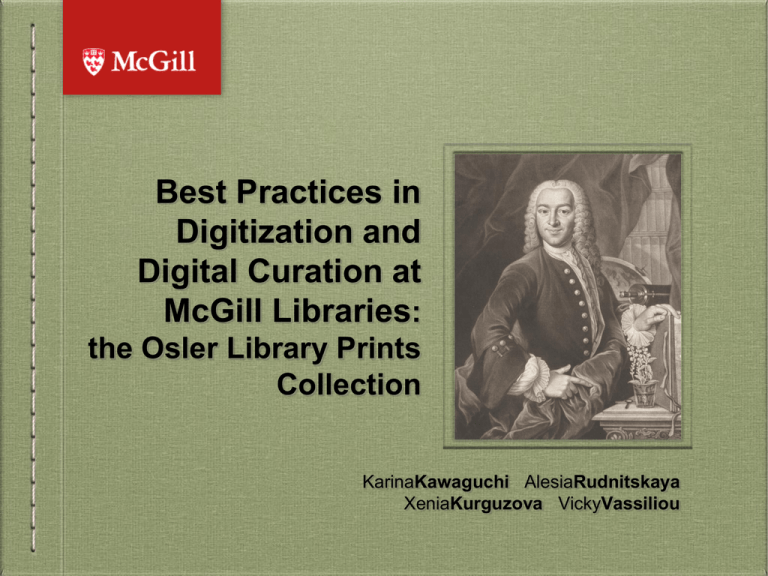
Best Practices in Digitization and Digital Curation at McGill Libraries: the Osler Library Prints Collection KarinaKawaguchi AlesiaRudnitskaya XeniaKurguzova VickyVassiliou Osler Library of the History of Medicine McGill University Library The Osler Library of the History of Medicine Sources: McGill Campus Scenes. http://www.mcgill.ca/photos/2003/january/ Osler Library. The William Osler Photo Collection. http://digital.library.mcgill.ca/osler/large/CUS_033-001_P.jpg Osler Library Prints Collection • Value: historic and artistic • Themes • Physical properties Let’s digitize! Budget – special donation Technology: scanners in place Staffing: team of librarians specialized experts and support staff brought in McGill’s Best Practices Repository Functions The OAIS Functional Model Source: Reference Model for an Open Archival Information System (OAIS). http://public.ccsds.org/publications/archive/650x0m2.pdf Best Practices Digital images: standards and quality TIFF •Storage JPEG • Access and delivery Best Practices Thumbnails/full record/full screen/zoom Scalable view (up to 6,450px × 4,500px) High quality resolution (up to 15 KB) Best Practices Comprehensive finding aids and rich metadata Exhaustive annotations • each digital object described by art historian/curator Dublin Core metadata scheme • easy to use • interoperable • OAI-PMH – compliant Controlled vocabulary • LC subject headings • authority files Best Practices Comprehensive finding aids and rich metadata Best Practices Comprehensive finding aids and rich metadata Best Practices Display and access user-centered interface ease of navigation visual aids multiple access points Best Practices High quality digital images Accessibility Information discovery Preservation Comprehensive and precise finding aids and rich metadata Contribution to knowledge Usability of the Website Challenges Challenges • Documentation of policies • Preservation strategies and contingency planning • Copyright • Visibility on the web References • Besser, H., Hubbard, S., & Lenert, D. (2003). Introduction to imaging. Los Angeles: Getty Research Institute. • International Federation of Library Associations and Institutions (IFLA). (2002). Guidelines for digitization projects for collections and holdings in the public domain, particularly those held by libraries and archives. Retrieved from http://www.ifla.org/publications/guidelines-for-digitization-projects-for-collections-and-holdings-in-the-public-domain • Federal Digitization Initiative Still Image Working Group. (2009). Technical guidelines for digitizing cultural heritage materials: Creation of raster image master files. Retrieved from http://www.digitizationguidelines.gov/guidelines/FADGI_Still_Image-Tech_Guidelines_2010-08-24.pdf • Humanities Advanced Technology and Information Institute, University of Glasgow (HATII) and The National Initiative for a Networked Cultural Heritage (NINCH). (2003). The NINCH guide to good practice in the digital representation and management of cultural heritage materials. Retrieved from http://www.nyu.edu/its/pubs/pdfs/NINCH_Guide_to_Good_Practice.pdf • National Information Standards Organization (NISO). (2007). A framework of guidance for building good digital collections. Retrieved from http://www.niso.org/publications/rp/framework3.pdf • RLG-NARA Task Force on Digital Repository Certification. (2005). An audit checklist for the certification of trusted digital repositories. Retrieved from http://www.crl.edu/sites/default/files/attachments/pages/trac_0.pdf • RLG/OCLC Working Group on Digital Archive Attributes, Research Libraries Group, & OCLC. (2002). Trusted digital repositories: Attributes and responsibilities : an RLG-OCLC report. Mountain View, CA: RLG. Acknowledgements • Christopher Lyons, Head of the Osler Library • Megan Chellew, Metadata Librarian Questions? Thank you! alesia.rudnitskaya@mail.mcgill.ca karina.kawaguchi@mail.mcgill.ca vicky.vassiliou@mail.mcgill.ca ksenia.kurguzova@mail.mcgill.ca
